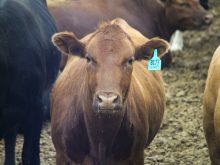The food-service industry is under pressure from shareholders, consumers, and activists to get behind improved animal welfare practices, says Tim Faveri, director of sustainability and responsibility for Tim Hortons.
“Every quick-service chain like ours is hit with animal welfare resolutions at annual meetings and in the social media,” Faveri said at the recent National Farm Animal Care Conference.
To respond to those demands, his sector needs proof that animal care codes are making a difference down on the farm.
“Farm animal care today is part of a growing focus on corporate social responsibility and sustainability in the food-service sector,” he said. “One of the most important aspects of this is being clear and transparent with the customer. We interface with the customers and we have to be able to tell the story about where our products come from.”
Read Also

Farming Smarter receives financial boost from Alberta government for potato research
Farming Smarter near Lethbridge got a boost to its research equipment, thanks to the Alberta government’s increase in funding for research associations.
Faveri acknowledged farmers and food suppliers are already suffering from audit fatigue on welfare and environment issues.
But his advice was to get used to it.
“This is about a journey — not a destination,” he said. “It has to be a journey of continuous improvement.”
He praised the Canadian livestock sector for developing new animal care codes, saying the animal welfare debate between farmers and consumers is not highly polarized here compared to the U.S.
He also said the food industry has to be careful not to let all the certification costs fall on producers.
But passing on those costs will be a challenge, said Susie Miller, director general of the Sector Development and Analysis Directorate at Agriculture Canada.
“Consumers are willing to only pay so much more for their food,” she said.
Nevertheless, the livestock industry has to “keep moving” on developing the codes and showing that they are working, Miller said.
“They have to be transparent and keep up with the science being developed around animal welfare,” she said. “And you have to keep working at the credibility of the codes. Nothing worth doing is ever easy. Change takes time, costs money, and requires commitment.”














